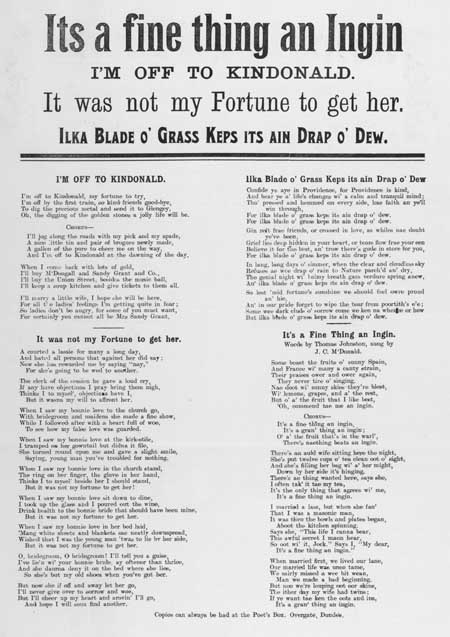
 |
| home | background | illustrations | distribution | highlights | search & browse | resources | contact us |
Broadside ballads entitled 'I'm off to Kindonald', 'It was not my Fortune to get her', 'Ilka Blade o' Grass Keps its ain Drap o' Dew', and 'It's a Fine Thing an Ingin' |
CommentaryThe first ballad begins: 'I'm off to Kindonald, my fortune to try, / I'm off by the first train, so kind friends good-bye'. The second ballad begins: 'A courted a lassie for many a long day, / And hated all persons that against her did say'. The third ballad begins: 'Confide ye aye in Providence, for Providence is Kind, / And bear ye a' life's changes wi' a calm and tranquil mind'. The fourth ballad begins: 'Some boast the fruits o' sunny Spain, / And France wi' many a canty strain'. The National Library of Scotland's collection includes a large number of broadsides, published by the Poet's Box of the Overgate, Dundee, which feature four or more ballads on one sheet. These are particularly interesting since it was common practice amongst most other broadside producers to publish ballads individually. Sheets carrying two or more ballads proved extremely popular with the public - people believed they were getting more for their money! It is not clear what the connection between the different Poet?s Boxes were. They almost certainly sold each other?s sheets. It is known that John Sanderson in Edinburgh often wrote to the Leitches in Glasgow for songs and that later his brother Charles obtained copies of songs from the Dundee Poet?s Box. There was also a Poet?s Box in Belfast from 1846 to 1856 at the address of the printer James Moore, and one at Paisley in the early 1850s, owned by William Anderson. Early ballads were dramatic or humorous narrative songs derived from folk culture that predated printing. Originally perpetuated by word of mouth, many ballads survive because they were recorded on broadsides. Musical notation was rarely printed, as tunes were usually established favourites. The term 'ballad' eventually applied more broadly to any kind of topical or popular verse.
|
Probable period of publication:
1880-1900 shelfmark: RB.m.143(128)

|